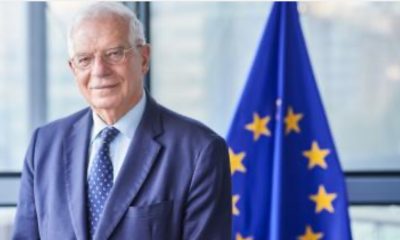EU
#OrganizedCrime 'aangehelp deur korrupsie aan Europese grense en swak toesig in vryhandelsones'

 A new RUSI report reveals how organized crime groups are benefiting from corruption at European borders, and exploiting limited controls in international free-trade zones to make substantial profits through illicit trade.
A new RUSI report reveals how organized crime groups are benefiting from corruption at European borders, and exploiting limited controls in international free-trade zones to make substantial profits through illicit trade.
"On Tap Europe: Organized Crime and Illicit Trade in Tobacco, Alcohol and Pharmaceuticals" is a major report examining the scale of illicit trade, and the methods of the organized crime groups who dominate it.
The first study of its kind, this report incorporates operational research with law enforcement agencies across the EU. Written by RUSI Research Fellow Clare Ellis, the report describes how "illicit trade is the epitome of modern organized crime", with groups directly reflecting legitimate business practices; responding to market opportunities, diversifying their activities, and capitalising on new technologies.
According to the OECD and EUIPO, trade in counterfeit and pirated products cost the EU as much as €85 billion in 2013, and that is before losses from smuggling genuine goods or manufacturing unlicensed generic products are taken into account. "This is not minor criminality, it is sophisticated organized crime on an international scale," said Clare Ellis.
The report identifies key enablers of illicit trade, including:
- Corruption at European borders. Corrupt officials can undermine otherwise strict controls, and enable the EU’s outer defences to be easily breached by organized crime groups importing counterfeit or unlicensed goods.
- Free-trade zones are exploited by organized crime groups around the world, taking advantage of their limited oversight to re-document shipments and conceal their true origin, or even to conduct parts of the manufacturing process.
- Postal and courier services are used by organized crime groups to transport illicit products, sending lower volumes of goods with greater frequency. Small courier companies represent a growing risk, with small vans regularly transporting hundreds of parcels across borders after only collecting minimal details from senders.
- The internet and social media enable the sale of illicit goods across Europe, in particular pharmaceutical products. While many consumers intentionally purchase goods in this manner, others are deceived into believing they are making a genuine purchase, with OCGs creating increasingly professional websites.
- Social acceptability is an important enabling factor for illicit trade across the EU, creating an environment in which demand for illicit products is tolerated.
On corruption at European borders, the report states: "The scale of corruption at the EU border may be difficult to quantify, but its role in facilitating illicit trade is becoming increasingly difficult to ignore." It argues: "Across the EU there are thousands of dedicated law enforcement professionals, but until comprehensive and concerted action is undertaken, the corrupt minority will continue to undermine their work."
The report recommends that "Europol and the European Border and Coast Guard Agency (Frontex) should establish a dedicated centre to support member states in tackling corruption within the public sector". It suggests that this centre could ‘provide expert guidance in establishing vetting procedures, offer training for the detection of corruption among officials, and support member state investigations.’
The report observes that free-trade zones act ‘as source or transit points outside Europe; and as entry points into the EU’ for illicit goods. It finds that: ‘While free-trade zones are an important part of global trade, the balance has not yet been found between facilitating trade and ensuring security.’
The report recommends: ‘International standards must be established for free-trade zones to prevent their descent towards lawless territories that enable organized crime.’ It argues that ‘States are unlikely to act alone as national measures would undoubtedly reduce efficiency, potentially driving legitimate business to competing free-trade zones. Instead, clear, unambiguous global regulation is required. The World Customs Organization is ideally placed – but currently too weak – to impose international change and should be reformed, following the model provided by the Financial Action Task Force (FATF) in regulating the international financial system.’
This report makes fourteen recommendations in total for the European Commission, its agencies and EU member states.
This study involved field research in five EU member states, (Greece, Italy, Poland, Romania and Spain) assessing the scale, routes and methods of organized crime across source countries, transit hubs and destination markets of illicit trade.
See also map: Free-trade zones in Europe
Deel hierdie artikel:
-

 Konferensies3 dae gelede
Konferensies3 dae geledeNatCon se aan-af-konferensie is deur die Brusselse polisie gestaak
-

 massa toesig4 dae gelede
massa toesig4 dae geledeLek: EU-ministers van binnelandse sake wil hulself vrystel van kletsbeheer grootmaat skandering van private boodskappe
-

 Konferensies4 dae gelede
Konferensies4 dae geledeNatCon-konferensie gaan voort by die nuwe Brusselse lokaal
-

 Europese Buitelandse Aksiediens (EAAS)4 dae gelede
Europese Buitelandse Aksiediens (EAAS)4 dae geledeBorrell skryf sy posbeskrywing


























